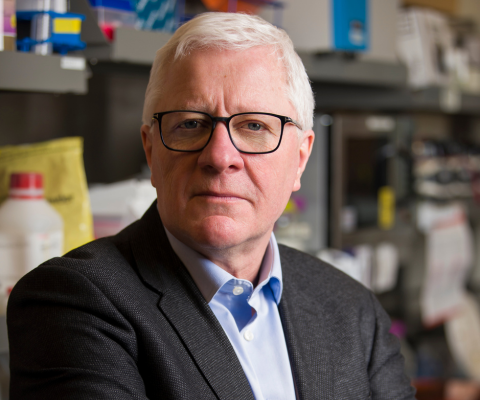John E. Dick
Researcher changed how we understand and fight cancer
John Dick, a world-renowned pioneer in cancer stem cell biology, has won the 2022 Canada Gairdner International Award. His groundbreaking work on leukemic stem cells has transformed our understanding, diagnosis and treatment of acute myeloid leukemia.
“Basically, our research is about trying to figure out what makes a stem cell a stem cell, and how does it go bad,” says the University of Toronto professor.
For more than three decades, Dr. Dick’s work has revolutionized the understanding of normal and leukemic hematopoiesis. A senior scientist and Canada Research Chair in stem cell biology at the Princess Margaret Cancer Centre in Toronto, his discoveries have changed views on the origin and nature of cancer and enabled new approaches to cancer therapy.
Dr. Dick made the first discovery of leukemia stem cells (LSC) in an acute myeloid leukemia patient. This finding established that cancer cells in a patient are not all equal; rather there is a hierarchy and only certain rare leukemia cells possess self-renewal, the key property of stem cells.
His discovery showed that “there’s only about one in a million cells that actually has the ability to regenerate leukemia when you transplant it in a mouse,” he explains. “And so that led to this whole idea that leukemia is just a caricature of normal development. You have one blood stem cell that can regenerate a large amount of blood; it’s a powerful cell. And it turns out leukemia works in a similar kind of way; there are rare leukemia stem cells that actually keep the cancer going.
“And when we began to study this in more detail, we realized that like normal stem cells these leukemia stem cells are also dormant or slowly replicating. This allows them to evade standard chemotherapy; they were the reason that leukemias look like they go away, but then they eventually come back from the surviving leukemia stem cells.”
Discovering that not every cancer cell is equal was, “a turning point for how we understand cancer, and how we study cancer.” It led to the exploration of cancer stem cells (CSCs) in other human cancers, such as breast, brain, colon, pancreas, skin and liver cancers.
Dr. Dick’s work highlights the need to ensure that CSCs are eradicated when therapy is delivered and the need for new therapies that target CSC vulnerabilities.
While he has spent all of his career in a research lab, Dr. Dick says the location of his lab when worked at SickKids in Toronto earlier in his career brought the meaning of his work into clear focus. His route through the building brought him past the hematology oncology ward.
“And you would see these kids, some of them were pretty sick, they don’t have any hair, they’re carrying the IV poles around. You would see the impact of cancer; it really focuses your mind. Every day, you walk through that, and you realize what you’re doing here is not just an abstraction, it’s not just solving a puzzle, it actually is about having an impact in the clinic.
“As we recognized that our work was having more impact, there becomes an imperative – we knew we had to keep going on this, because it was so important. That gives you a sense of urgency as well, because we need to do better. Too many people are still failing their cancer treatments, and we need to improve that.”

